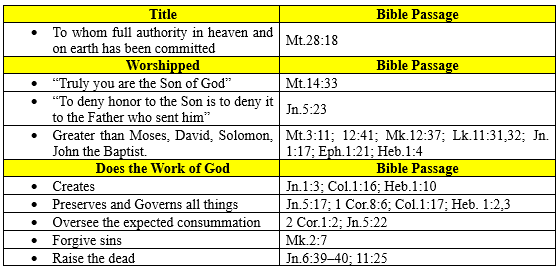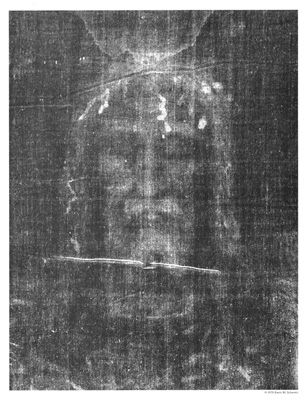THE PRE-EXISTENCE AND THE ETERNALITY OF JESUS CHRIST FOUND IN THE OLD & NEW TESAMENT pt.2
- CLB. Advincula

- Aug 26, 2020
- 4 min read
Here is the 2nd installment of our article series on Christology. This is quite a read but very informative if you are planning to use this for ministry or for your own personal study. In here we have taken the liberty to find inspiration in the beautiful work of Thomas Oden; "Classical Christianity".
The Eternal Son in the New Testament
In Thomas Oden’s Classical Christianity, we are taught that one must first establish the personal identity of the Sonship of Jesus and only on that basis can we all consider His divine work of grace (i.e. Ontological & Economic). Person and work may be conceptually distinguishable but they are related inseparably. Always appearing together because work (opus) is always done by the person (persona). However the work of Jesus is divinely unique in that it can not be done except if the person fulfills both credentials: ordinarily human and truly divine. We call this the Theandric Nature of Jesus, which describes the Hypostatic union of the complete humanity and complete deity of the Christ. To understand the eternality of Jesus, let us first define these 2 terms briefly:
Theandric Nature – A combination of the Greek terms theos & anthropos, literally meaning God-man. The union of Jesus’ humanity and divinity, one person having 2 natures.
Hypostatic Union – Denoting the union of the 2 natures: divine and human, in the one person of Jesus. Defined at the Council of Chalcedon (AD. 451). It seeks to affirm the personal unity as well as the 2 natures (i.e. 100% God & 100& Man).
Contrary to what Ebionism, Arianism and what some cults teach (e.g. INC, Jehovah’s Witnesses, Mormons and Islam), Biblical Christianity stresses that the historical figure, Jesus of Nazareth, also being the 2nd person of the Trinity did not have a beginning nor was he a created being. Developed by Cyril of Alexandria approximately between A.D. 434-438, he compares the theandric nature of Christ to a human being’s distinct yet unified composition of a material (fleshly body) & immaterial (soul) while deflecting any Dualistic tendencies. Cyril was careful to maintain an orthodox position describing that the Christ is a conjunctional being, but can be conceptually distinguished as both fully human and fully divine. As the apostle John wrote, by the inspiration of the Holy Spirit, in his Gospel on the 1st verse of the 1st chapter: In the beginning was the Word, and the Word was with God, and the Word was God and that through Christ all things were created, nothing was created without Him (cf. Jn. 1:3). According to Philo a Hellenistic-Jewish philosopher a contemporary of Jesus and the Apostles (c. 20 B.C. – A.D. 50), Word in Greek is the Logos meaning The Mind of God, also understood as the eternal Word of God or Divine Expression. Based on the passage, Jesus is the Word, the begotten Son (cf. Jn.1:12) of the Father and at the same time is God. To understand better, Westminster Dictionary of Theological Terms define key concepts that could help us extrapolate what the apostle meant when he spoke of Monogenes:
Begotten – “Fathered by" or "derived from." Used in the Authorized Version (KJV) as a translation of (Gr.) monogenes, "only begotten," in reference to God's Son, Jesus Christ (John 1:14, 18; 3:16, 18; Heb. 11:17; 1 John 4:9).
Eternal generation – The relation of the Son to the Father in the Godhead, with the Son being "eternally begotten" or "generated" by and from God the Father.
Homoousios – (Gk. homos, "same," and ousios, "substance") Homoousios, "of the same substance" was a term used in early church Christological debates and adopted by church councils of Nicaea (AD. 325) and Constantinople (AD. 381) to indicate that Jesus Christ was of the same essence as God the Father. It contrasts with (Gr.) heteroousios and homoiousios.
Consubstantial – (Lat. consubstantialis, "with or of the same nature and kind") With, or of, the same substance or being. Equivalent of Gk. homoousios, used in the creed of Nicaea (A.D. 325) to designate the relation of Jesus Christ to God.
These terms simply point out that Jesus as God the Son, is of the Father since eternity past and will always be one with the Father to eternity future. The eternal Father is the source of the Logos thus there was no point in time where the Son was not, for only with the Mind of God, the Father is God. The Son is of the same nature & essence and always will be distinctly with God. John continues in his gospel to describe the glory that Jesus had with the Father even before the world ever began in John 17:5. We also read in John 8:58, what seemingly a blasphemous claim of Jesus’ existence to be even before Abraham, where it is written that the faithful patriarch saw Jesus and rejoiced to see His time come. At the same time, Jesus plainly claims co-eternality & co-equality in His unison with the Father to which the Jews reacted abrasively in John 10:30-33. In the Pauline epistles, we see the same affirmation of Jesus’ pre-existence in Colossians 1:16-17, and it reads:
For by him were all things created, that are in heaven, and that are in earth, visible and invisible, whether they be thrones, or dominions, or principalities, or powers: all things were created by him, and for him: And he is before all things, and by him all things consist.
As the New Testament witness continues to affirm us, we should imbibe that the argument for Christ’s pre-existence is founded upon His theandric nature and God’s Trinitarian attribute of unity. Deductively, because God is a Tri-unity and that there are evidences for Christ’s Sonship (i.e. The Resurrection), we can definitely conclude that Jesus indeed pre-exist before the Nativity. For further evaluation, I’ve collected additional New Testament passages that pertain to Jesus’ deity and/or preexistence realized in His birth, resurrection, exaltation and millennial reign:
Beautifully, it is also told to us in the book of Hebrews 1:2, that Christ is not just the immediate agent of Creation (cf. Jn.1:3) but also the One that holds all things together and the Heir of all that is Created: Hath in these last days spoken unto us by his Son, whom he hath appointed heir of all things, by whom also he made the worlds;







Comments